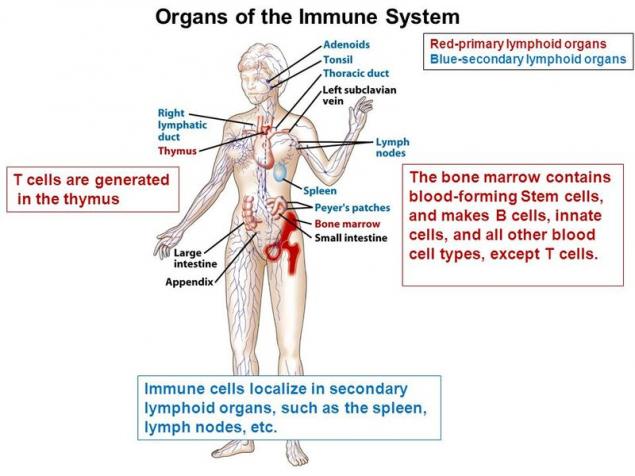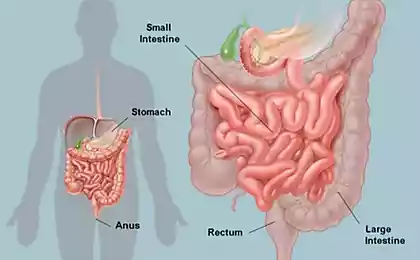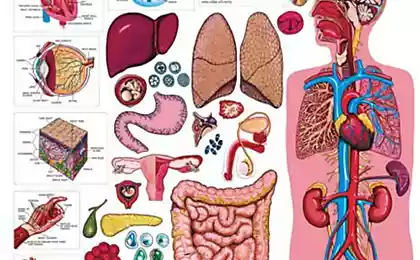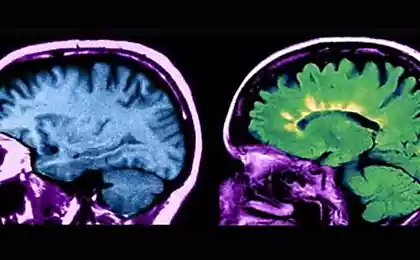244
Metaphors of health: The immune system is our physiological self
To convey meaning, we use comparisons, tell stories, and share experiences. Such comparisons, analogies, and stories in NLP are called “metaphors” (from Greek, “transference”) and are metaphors in themselves.
Metaphors cannot be true or false; they are simply ways of thinking – sometimes useful and sometimes limiting.
A metaphor makes more sense than a simple description. You can think of a metaphor as a hologram: when you choose a phrase that conveys a metaphor, most of it is implied, it is present, but not pronounced aloud. It's like the underwater part of an iceberg.

Medicine as War
Now we're getting into a makeover involving different metaphors of health. The prevailing medical metaphor is not balance but war. Health is described as a successful defense against constant attacks from outside.
We use military vocabulary so naturally that we don’t even think about it.
And our immune system? This should be our most secretive security service to fight organized infection. She patrols the body, vigilantly guarding it from intruders. She attacks them, kills them and then throws away the remains.

Health is a constant readiness to repel the attack of unscrupulous microorganisms, it is an organism in a state of siege. The fight against heart attack and the war on cancer are being waged with huge defense reserves in order to create more and more sophisticated apparatus and drugs to defeat the enemy, despite the research that shows that we are able to create these conditions at home. We've already infiltrated the enemy camp.
A battle cannot be won if you fight for both sides simultaneously.
Medical Metaphor: Health is an Armed Fight1. We exist separately from the environment.
2. We resist attacks from outside forces over which we have no control.
3. The body is constantly under siege.
4. Health is a struggle.
5. We win battles by killing pathogens.
6. The body is an unusually complex apparatus, and only military experts (doctors) are allowed to work with it.
7. The immune system is a killing machine.
8. Progress in medicine implies better weapons and stronger drugs to fight disease.
9. Even if we can win battles, we end up losing the war because we die.
Metaphors may not be right or wrong, but they have consequences.What are the consequences of acting as if the military metaphor is correct? How does it affect our thinking?
First, It draws our attention to disease, not health.. If you are under siege, you will naturally be wary of looking around, waiting for enemies to attack. Therefore We look outward, not inward.. This pushes us to rely on the opinions of professionals as if they were managing our own health.
We can become dissociated from our own health. Surgery is an extreme form of dissociation from parts of our body. We literally separate ourselves from them.
As a consequence of the military metaphor, we rely too heavily on medicine’s ability to repair damage through drugs and surgery, and we completely ignore what many military experts consider the greatest art of warfare – to engage in battle only when absolutely necessary.
How can we use the metaphor of struggle differently? How would we react to the disease if it was a hostile attempt to seize power by another company? How would you plan to attack them? After all, there may be more civilized ways than killing their leader and bombing the headquarters of the joint command.
Martial arts are another way of thinking. How could one maintain one’s health gracefully by using the forces of one’s opponents against the other? Would you like to become a health black belt?
What do all great generals say about winning the war? Know your enemy. The Art of War is the oldest military treatise in the world. In it, Sun Tzu wrote:
“If you know the enemy and know yourself, you need not fear for the outcome of a hundred battles. If you know yourself but do not know the enemy, you will lose for every victory. If you know neither the enemy nor yourself, you will be defeated forever.
So while still remaining within the military metaphor, You can take command of the battle for health.. Try to learn as much as possible about each of your diseases – from books, asking questions, paying attention to your body. Stop being a corporal and start acting like a general: this is your army and you have to lead it.
The disease can teach us a lot. Often we try to beat her and achieve submission with drugs, without understanding her or our reactions to this disease And there are consequences (just like in real life): the enemy returns even stronger, and the drugs can already harm your own territory, your own body.
Health as Balance 1. We are part of the world.
2. Health is the balance between our way of being and our environment.
3. The disease is a sign of imbalance.
4. The disease can be a sign of health – it can restore balance.
5. We know our bodies better because we know them from the inside out.
6. The body is constantly in contact with microorganisms. Some are beneficial, others are harmful, and still others can cause specific symptoms in sensitive organisms.
7. We stay healthy by taking care of ourselves and paying attention to our body signals.
8. We can influence our thoughts, emotions and environment.
9. The immune system is our physiological self. She knows what is “I” and what is not. It removes antigens, preserving our integrity.
10. Recovery is a natural process. We may need outside help if we are too out of balance.
11. We are always healthy to some extent because we are always in balance. published
Joseph O’Connor and Ian McDermott, NLP and Health
P.S. And remember, just changing our consumption – together we change the world!
Source: vk.com/wall-23903469?w=wall-23903469_5377
Metaphors cannot be true or false; they are simply ways of thinking – sometimes useful and sometimes limiting.
A metaphor makes more sense than a simple description. You can think of a metaphor as a hologram: when you choose a phrase that conveys a metaphor, most of it is implied, it is present, but not pronounced aloud. It's like the underwater part of an iceberg.

Medicine as War
Now we're getting into a makeover involving different metaphors of health. The prevailing medical metaphor is not balance but war. Health is described as a successful defense against constant attacks from outside.
We use military vocabulary so naturally that we don’t even think about it.
- You are constantly attacked by “foreign invaders”: pathogens try to “penetrate” inside and cause disease.
- You need to be constantly alert.
- Tonics and vitamins can “strengthen the body’s defenses.”
- Recovery means “fighting” the disease, “fighting” the malaise.
- You may have sudden seizures or contractions.
And our immune system? This should be our most secretive security service to fight organized infection. She patrols the body, vigilantly guarding it from intruders. She attacks them, kills them and then throws away the remains.

Health is a constant readiness to repel the attack of unscrupulous microorganisms, it is an organism in a state of siege. The fight against heart attack and the war on cancer are being waged with huge defense reserves in order to create more and more sophisticated apparatus and drugs to defeat the enemy, despite the research that shows that we are able to create these conditions at home. We've already infiltrated the enemy camp.
A battle cannot be won if you fight for both sides simultaneously.
Medical Metaphor: Health is an Armed Fight1. We exist separately from the environment.
2. We resist attacks from outside forces over which we have no control.
3. The body is constantly under siege.
4. Health is a struggle.
5. We win battles by killing pathogens.
6. The body is an unusually complex apparatus, and only military experts (doctors) are allowed to work with it.
7. The immune system is a killing machine.
8. Progress in medicine implies better weapons and stronger drugs to fight disease.
9. Even if we can win battles, we end up losing the war because we die.
Metaphors may not be right or wrong, but they have consequences.What are the consequences of acting as if the military metaphor is correct? How does it affect our thinking?
First, It draws our attention to disease, not health.. If you are under siege, you will naturally be wary of looking around, waiting for enemies to attack. Therefore We look outward, not inward.. This pushes us to rely on the opinions of professionals as if they were managing our own health.
We can become dissociated from our own health. Surgery is an extreme form of dissociation from parts of our body. We literally separate ourselves from them.
As a consequence of the military metaphor, we rely too heavily on medicine’s ability to repair damage through drugs and surgery, and we completely ignore what many military experts consider the greatest art of warfare – to engage in battle only when absolutely necessary.
How can we use the metaphor of struggle differently? How would we react to the disease if it was a hostile attempt to seize power by another company? How would you plan to attack them? After all, there may be more civilized ways than killing their leader and bombing the headquarters of the joint command.
Martial arts are another way of thinking. How could one maintain one’s health gracefully by using the forces of one’s opponents against the other? Would you like to become a health black belt?
What do all great generals say about winning the war? Know your enemy. The Art of War is the oldest military treatise in the world. In it, Sun Tzu wrote:
“If you know the enemy and know yourself, you need not fear for the outcome of a hundred battles. If you know yourself but do not know the enemy, you will lose for every victory. If you know neither the enemy nor yourself, you will be defeated forever.
So while still remaining within the military metaphor, You can take command of the battle for health.. Try to learn as much as possible about each of your diseases – from books, asking questions, paying attention to your body. Stop being a corporal and start acting like a general: this is your army and you have to lead it.
The disease can teach us a lot. Often we try to beat her and achieve submission with drugs, without understanding her or our reactions to this disease And there are consequences (just like in real life): the enemy returns even stronger, and the drugs can already harm your own territory, your own body.
Health as Balance 1. We are part of the world.
2. Health is the balance between our way of being and our environment.
3. The disease is a sign of imbalance.
4. The disease can be a sign of health – it can restore balance.
5. We know our bodies better because we know them from the inside out.
6. The body is constantly in contact with microorganisms. Some are beneficial, others are harmful, and still others can cause specific symptoms in sensitive organisms.
7. We stay healthy by taking care of ourselves and paying attention to our body signals.
8. We can influence our thoughts, emotions and environment.
9. The immune system is our physiological self. She knows what is “I” and what is not. It removes antigens, preserving our integrity.
10. Recovery is a natural process. We may need outside help if we are too out of balance.
11. We are always healthy to some extent because we are always in balance. published
Joseph O’Connor and Ian McDermott, NLP and Health
P.S. And remember, just changing our consumption – together we change the world!
Source: vk.com/wall-23903469?w=wall-23903469_5377
This little black rectangle quickly and easily disinfects the water
How to believe in themselves: inner truth























